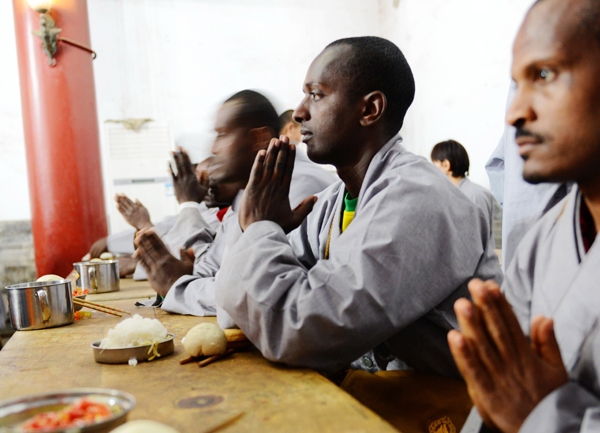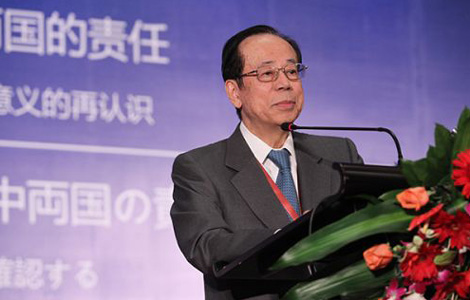Path to inner peace
Updated: 2013-10-29 00:03
By Qi Xin in Kaifeng and Han Bingbin in Beijing (China Daily)
|
|||||||||||
A cultural exchange course offers young Africans a tough but rewarding experience at the famous Shaolin Temple. Qi Xin in Kaifeng and Han Bingbin in Beijing report.
 |
|
African students join the monks for the lunch at Shaolin Temple that begins with a ritual before eating. Photos by Xiang Mingchao / China Daily |
At 4 am in a hotel in Dengfeng, Henan province, a 32-year-old Nigerian woman, Peace Emezue, wakes to the cries of "jihe"! ("assemble"). Half an hour later, still sleepy, she shows up in the lobby to join 19 other young Africans, all dressed in gray robes and canvas shoes.
They walk in two lines for 15 minutes to the Shaolin Temple. This is the routine six days a week while living the life of a Shaolin monk. Founded in the fifth century, the monastery is long famous for its association with Chinese martial arts and particularly with Shaolin kung fu.
The morning classes start with these "disciples" closely following the monks' moves and listening to them chanting, a chance to observe and hopefully experience for themselves a state of tranquility.
Like her name, Peace Emezue says she has sensed the spiritual moment several times.
"When I came to Shaolin, I was surprised because the life here is peaceful and simple," she says. "But it is also quite tough — the morning exercises, the hard training. We do it every day except Sundays. It is a lifestyle I am not used to, but I am getting used to it now."
To strengthen cultural exchanges between China and Africa, the Ministry of Culture launched the "Shaolin Kung Fu Training Class for African Disciples" last month, enrolling 20 students from Tanzania, Ethiopia, Mauritius, Uganda and Nigeria. The course lasts three months.
Emezue is one of only three women in the group. The other two are Chinese-Africans from Mauritius. As a karate champion, Emezue was chosen by her local government for the program to encourage women in Nigeria to take up martial arts, especially kung fu.
"Women also love kung fu and Chinese culture, and I will return and teach my ladies how to meditate and do the moves of kung fu and qigong (breathing exercise)," she says. "Since I came here, the training has really made me strong, especially my legs, because we do a lot of running and mountain climbing."
Wang Yumin, dean of the Shaolin Temple's foreign affairs office, says many foreigners are attracted to Shaolin because of its reputation for kung fu and its use in Buddhism.
Shi Yanbo, a kung fu master at the temple, says many of the disciples had experience in other martial arts or had learned moves from watching films, but simulating them was not enough. Kung fu is deeply rooted in the culture, he says.
So students also have to learn meditation and study Buddhist doctrines that guide people's actions. To help them gain greater understanding of Chinese kung fu, the students are also offered Chinese language courses.
Related Stories
Laowai Not: One African's kung fu dream 2013-10-20 15:41
African designer's fashion tailored in China 2013-09-29 09:51
Africans learn kung fu at Shaolin Temple 2013-09-27 10:52
Today's Top News
Fonterra botulism scare laid bare in board inquiry
Apple's quarterly results disappointing
Experts quash Wi-Fi cancer rumor
Li gives credit to special friend from Germany
Lightening marriage over in a flash
Baidu's fund raises 1b yuan
Storm wrecks havoc in S Britain, leaving 4 dead
'Prime time' for Chinese firms to invest in EU
Hot Topics
Lunar probe , China growth forecasts, Emission rules get tougher, China seen through 'colored lens', International board,
Editor's Picks

|

|

|

|

|

|





